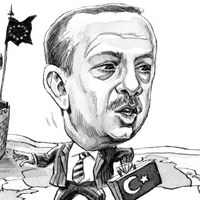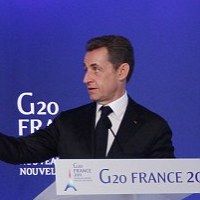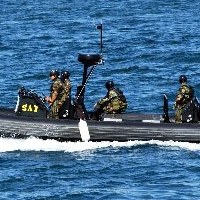![]()
By Rob Harris
The Knesset speaker’s visit to Ireland, Irish F.M. Eamon Gilmore’s visit to Gaza, and the looming visit of an anti-Israeli Irish President

Irish Foreign Minister Eamon Gilmore (L) shakes hands with UNRWA commissioner-general Filippo Grandi during his visit to the UNRWA aid distribution centre in the Jabalia refugee camp in the northern Gaza Strip on January 27, 2012. (AFP photo)
Reuven Rivlin, the parliamentary speaker of Israel’s Knesset, recently visited Ireland in an official capacity. The visit was of significance because the two nations have had a difficult relationship for a long time, largely due to persistent Irish criticism of the Jewish State over the previous decades. Some background to the visit is dealt with in an earlier article.
There were some predictions that the visit could be a difficult ride for Mr. Rivlin, as was suggested in the press release on the Knesset website:
This week Knesset Speaker Reuven Rivlin leaves for an official reciprocal visit to Ireland, despite the shadow of critical and even hostile attitudes towards Israel prevailing in Irish media and public opinion.
The opinion was understandable. There is a genuine and sometimes baffling hostility expressed by a significant number of Irish people toward Israel. This even includes a substantial contingent of the Irish parliament itself. Surprisingly however, the visit has been portrayed as a positive experience, and has yielded a number of developments! The visit’s status was upgraded. Mr. Rivlin stayed in the official guesthouse for visiting dignitaries, and unexpectedly he also met with President Michael D. Higgins.
Rivlin met with the Oireachtas Committee on Foreign Affairs and Trade on January the 18th. It was apparently a polite affair, despite the presence of Israeli bashers like Senator David Norris. Mr. Rivlin also invited a delegation from the Committee to visit Israel to continue discussion on the Middle-East peace process!
Some unsurprising hostility
Regrettably, the visit was not all sweetness and light. That same day Rivlin was forced to enter through the back door of the Irish Parliament out of fear for his safety, due to a relatively aggressive pro-Palestinian protest, where one Martin O’Quigley of the IPSC stated: “We are here to protest the presence in Dail Eireann of an Israeli Paramilitary delegation.” A remarkable assertion considering Israel has been a democratic sovereign nation for six decades! It is as if Mr. Quigley had just emerged from a time machine that jumped from 1947! He may have meant to say “parliamentary” but probably not because his statement reflects the IPSC’s unwillingness to accept Israel’s actual existence as exemplified by their conduct at the Israeli Film Festival last November when they chanted “From the river to the sea, Palestine will be free”, and intimidated visitors.
Yet such protests were to be expected, and the stance of the IPSC was just as predictable, citing some common pro-Palestinian tales. They claimed the blockade of Gaza was a “siege” but no siege would include the transportation of massive amounts of aid through its borders by an opponent. They claimed erroneously that Israel wasn’t allowing construction materials into Gaza, and blamed Israel for a failure to provide clean water, when Hamas has repeatedly declined Israeli offers to repair said infrastructure. They complained about “peaceful” Palestinian protestors being tear gassed etc., by the Israeli forces on a weekly basis, perhaps in reference to the mythically peaceful protests at Bil’in which always result in significant violence usually initiated by Palestinian youths. Quigley stated “Also in the West Bank Israeli settlements are continuing to expand taking Palestinian land.” It is an outright lie to suggest Israeli settlements are taking in more land, in fact Israel has not recognised a new settlement since the mid 1990’s, and dismantles settlement outposts. They need to freshen up such well-worn propaganda.
Sein Fein, the most intensely pro-Palestinian of the large parties in the Irish Parliament, expressed some hostility to Rivlin’s presence, with their Foreign Affairs spokesman, Pádraig Mac Lochlainn, absurdly claiming to speak for the Irish people in this respect. A symbolic gesture was made when party leader Gerry Adams and a coterie of his TD’s and Senators met the Palestinian emissary to Ireland. Nonetheless Adams uttered words of welcome to Rivlin at the Dail.
How pro-Palestinian are the Irish?
During Rivlin’s visit he stated, “In Israel, we get the impression that Ireland is constantly denouncing us.” Indeed Ireland is among the leading pro-Palestinian voices in the West. It consistently votes against Israel’s interests at EU forums and at the UN. Similarly Irish pro-Palestinian activism is particularly intensive. The Irish presence on blockade-breaking flotillas is always substantial, an odd fact considering the small national populace.
Rivlin noted that Israel enjoys some sympathy for its positions although “the criticism towards Israel from Ireland is very severe.”
It seems Rivlin discovered some subtleties. Whilst the pro-Palestinian movement leads any debate by being the most organised and shouting the loudest, believing its hype will make Ireland appear to be an intimidating anti-Semitic cesspool on a par with the likes of Norway and Sweden. The truth is that the vast majority of people just follow what is said in the media. Ireland is a fairly distant nation, and most people are not invested to any extent in the conflict, despite the intensive coverage it gets in the news.
The reality is that while Ireland is anti-Israel, and a segment of the populace is motivated by anti-Semitism, most people just don’t have a strong opinion one way or the other, and know relatively little about the issue. They simply accept the word of the media and associated pundits, who tend to be anti-Israel, sometimes virulently. Of course there are other elements to consider but this rather banal explanation addresses to a significant degree the Irish take on Israel.
Oddly enough, Rivlin’s relatively positive visit received surprisingly little coverage in the mainstream Irish media even though it was the most important Israeli visit since Belfast born Chaim Herzog, then president of Israel, came over in the Summer of ‘85.
Some background, and the shift to “a historical closeness.”
Despite the aforementioned hostility, the Irish administration made an effort to be polite, as the wording on the Presidential website indicated: “President receives H.E. Mr. Reuven Rivlin, M.K. Speaker of the Knesset on a courtesy call”.
As the Knesset press-release noted, Rivlin was the highest Israeli politician invited to Ireland for an official visit in over two decades, and it also quoted the Irish Foreign Ministry as stating the visit would mark “a historical closeness.”
This thawing of relations may in part be due to a recent change in governance, after a devastating general election, in which the predominant role (since the 1930’s) of the Fianna Fail party evaporated, due to their disastrous handling of the economy. The present coalition government comprises of the centrist party Fine Gael, which is perhaps the least antagonistic political party toward the Jewish state, and Labour, which being a leftist party, is a mixture of members who are hostile and others far less so.
The ill-intent toward Israel may be in part due to an undercurrent of post-Holocaust anti-Semitism which survived in Ireland, perhaps because it was uniquely isolated as a neutral state on the periphery of Europe during World War II. Ireland never had anything more than a very small Jewish community, which would have altered the balance of discourse on such topics. Thus a silent anti-Semitism survived in a form intermingled with Catholicism and Irish Republicanism. It led to a near-absolute acceptance of pro-Palestinianism amongst the political elites, especially Fianna Fail, which is an offshoot of the Original IRA/Sein Fein, and the more radical left, which includes Sein Fein/IRA today. Indeed Fianna Fail and Sein Fein representatives made up part of the Irish flotilla contingent. Today there is no effective dissenting voice in Ireland.
Late last year a minor squabble broke out when an unnamed Israeli diplomatic official stated “The Irish government is feeding its people with anti-Israel hatred.” The article made a number of errors and the stance of the Israeli official was unjustified. He should have been directing his criticism of the Irish parliament as a whole because it features an increasing hard-left contingent, and the coalition government was continually attacked on all sides of the political establishment for not being aggressive enough with Israel, when fourteen Irish citizens were detained in November, after another Gaza bound flotilla attempted to break the blockade.
The prospective visit of the Irish anti-Israeli President
Perhaps the most surprising development is the news that the President of Ireland, Michael D. Higgins, may be invited to visit Israel. Apparently such executive decisions have to be made by Israeli President Shimon Peres. This development comes after Reuven Rivlin was surprised to obtain an invite to meet with Mr. Higgins, possibly suggesting the Irish President was initially reluctant to do so.
Mr. Rivlin said he asked the President if he would like to visit Israel: “You can meet everyone in our neighbourhood”. Apparently he would also be welcome to meet Mahmoud Abbas, president of the Palestinian Authority, in the West Bank, and a visit to Gaza may also possible, allowing for considerations over security.
Rivlin stated that Higgins told him he was not anti-Israel! However, Higgins, a senior politician in the Labour party, has been one of Ireland’s most intense critics of Israel for years. His hectoring tone remained a near-constant until he ran for the office of president last year so there is little evidence his attitude has changed to any extent.
Higgins advanced repeatedly a stance of boycott against Israel, whilst not affording any significant criticism toward the Palestinian opposition. Quite the opposite in fact. He went as far as to defend Hamas as being Gaza’s the legitimate democratic representatives
The Labour Party has consistently condemned attacks on civilian targets in Israel, but it has to be acknowledged that Hamas is the democratically elected administration in Gaza.
Higgins has often displayed a highly prejudicial view of the conflict. For example, one parliamentary debate after the 2010 Gaza flotilla confrontation, illustrates a starkly belligerent attitude toward Israel:
httpv://www.youtube.com/watch?v=mzynO5YUrFE
In his speech he asserted that the children of Gaza were starving, which has clearly been proven to be an untruth. He continually attacked Israel as no respecter of international law. A blockade is legal when it has been shown that those being blockaded pose a serious military risk, which a given blockade can minimise, as the Palmer report asserted. The flotillas had intended to break the blockade, which can only be maintained legally if it is enforced effectively.
Higgins also cited as illegal the collective punishment of civilians. The people of Gaza effectively brought Hamas to power on a mandate of further conflict, and whilst collective punishment should be avoided, military action in a populated region, especially where the relevant military organisation is embedded in densely populated areas, will inevitably lead to civilian losses. When facing rocket attacks with a renewed vigour, the Israeli State had little option but to respond after the populace near Gaza had put up with attacks for years, leading to a substantial loss of the population of Sderot, for example.
Higgins also claimed that Israel made no distinction between the civilian and military. Yet Hamas themselves admitted in September 2010 that at least half the losses in Gaza were their own, which coincides with Israel’s estimates rather than those of pro-Palestinian NGO’s and the UN. Faced with conflict in a region with a high population density of around 4,000 per square mile, it is actually a testament to Israel’s care that half or less of the total deaths were militants. Whilst briefly mentioning the rockets in Sderot perhaps in an attempt to appear balanced, he otherwise attacked Israel continually.
Absurdly Higgins separated Hamas’ political wing from its military wing. There is no real distinction, with supposed moderates like Ismail Haniyeh calling for blood. Clearly Higgins creates a false dichotomy that suits an agenda. All members of Hamas subscribe to the same charter, of which Chapter Seven calls for the genocide of the Jewish populace the world over, and the destruction of Israel. Higgins has called for the removal of Hamas from the EU proscription list, and sought communication between Hamas and the Irish State.
Higgins’ remarkably pugnacious attitude was evident when he stated that he was particularly outraged that those who advocate bringing Hamas in from the cold could be considered supporters of terrorism! He was also very angry that there should be any question about the intent of those on board the flotilla ships, a remarkable stance when the only serious violence occurred on the Mavi Mariner, a ship owned by the IHH, a group shown to have links with terrorist organisations. He even wanted an end to what he claimed was the “blackening” of the reputation of Gaza UNRWA head John Ging. Ging is notoriously one-sided in his exclusive condemnation of Israel. Despite trumpeting democratic values by reminding us that Hamas were democratically elected, it would seem Higgins is no respecter of free speech, the cornerstone of democracy, as he wants an absolute end to all dissenting opinion on pro-Palestinianism!
Higgins’ anti-American views led to the courting of individuals like Nicaraguan dictator Daniel Ortega who aided terrorists in the past, and a disturbing stance regarding 9/11. On a programme called Ireland AM (TV3), just one day after 9/11 itself, Higgins was extremely critical of US foreign policy. He came uncomfortably close to justifying the act at a time when it was thought up to 50,000 could have died!
In 2007 Higgins was to stand on the same platform as Ibrahim Mousawi, then head of Hizbullah’s Al Manar TV, which numerous Western countries have banned due to its intensive anti-Semitic content. Mousawi has referred to Jews as “a lesion on the forehead of history”, and other niceties.
As a result, the fact that Michael D. Higgins reputedly expressed a desire to visit Israel, and speak in the Knesset, may be a puzzling one, and should be met with some reservations. Considering his past conduct, it is legitimate to query whether or not he is a suitable figure to address the Knesset itself.
The Foreign Minister’s visit to Israel and the Palestinian territories
The week following Mr. Rivlin’s visit, Eamon Gilmore, Ireland’s Minister for Foreign Affairs, Tanaiste (deputy prime-minister), and leader of the Labour Party, visited the region. He began his visit in Gaza on January the 27th. Like Higgins, Gilmore has been strongly critical of Israel for some time although his stance is not as thoroughly one-sided.
During his time in Gaza, Gilmore reiterated his call for Israel to end the blockade of Gaza. He met Palestinian NGOs, UN representatives including the head of UNRWA, and UN operated schools and projects. He did not meet Hamas representatives, which Israel requests of visiting dignitaries due to worries over legitimisation. Significantly, Gilmore was scheduled to stay at a hotel in East Jerusalem for one night of his four-day tour. Nonetheless his criticism of Israel’s approach to Gaza was harsh:
It is dispiriting to see how little real change there has been in Gaza since the end of the Israeli military operation against Gaza three years ago.
What I have seen today has reinforced my belief that it is utterly unjust as well as counterproductive to subject Gaza to these restrictions, to choke off its economy, and to reduce its people to a state of complete dependency.
Gilmore didn’t seem to quite grasp the true motives of the Gaza blockade-busting flotilla exercises due to his description of their behaviour: “Flotilla is a voluntary activity by individuals and organisations — they do that obviously in response to the blockade.” Indeed their response is partly due to the blockade but their intent is clearly to provoke a confrontation with Israel, which would of course cause an international furore, in a further effort to demonise and delegitimise the Jewish State. Their humanitarian stance, expressed as a wish to deliver small amounts of aid of often dubious quality, when other avenues are open to them, tends to be accepted without question by Irish politicians, and the mainstream media, even though it stretches credulity to breaking point.
The following day Gilmore travelled to Ramallah where he met Mahmoud Abbas and other members of the Palestinian Authority. On Sunday he visited Israel, to speak with Binyamin Netanyahu and foreign minister Avigdor Lieberman. He raised his concerns about Gaza, and advocated confidence building measures. Lieberman asserted that he wants a breakthrough but it must be a sustained effort without the PA constantly seeking excuses to pull out.
Contrasting approaches toward incitement and settlement
When Gilmore met Netanyahu, in front of the cameras, prior to proper discussions, both gave short speeches in the form of a sort of slightly uncomfortable dialogue. Netanyahu spoke first and pointedly asked Gilmore about the incitement to hatred forwarded by the Palestinian Authorities. He specifically cited the glorification of the killers of the Fogel family on PA television, and the recent incitement to kill Jews by the Mufti of Jerusalem:
httpv://www.youtube.com/watch?v=ylzkWRjoiOc
I hope you demand that condemnation [presumably from the Irish State] because the only way to move to peace is to prepare our people for peace and not for brutal terror. We hope that these talks will continue. We’re prepared to continue these talks, we hope the Palestinian Authority decides to resume the talks and back away from terror and glorification of killers. This is our hope. I hope you can help us with that.
Unfortunately Gilmore didn’t address or even allude to that point at all. At the end of his three-day visit, Gilmore stated:
I’m aware that Ireland has been characterised in the Israeli press as the most anti-Israel member of the EU but I don’t think this is accurate. There is a great deal of goodwill in Ireland for Israel. Ireland’s support for Palestinian self-determination shouldn’t be interpreted as hostility to the state of Israel.
Whilst it is fair to suggest that Ireland is not the most anti-Israeli nation in the EU, Ireland has still had a constant policy of criticism toward Israel for decades, with Irish politicians having an inability to take seriously the grave threats the Jewish State faces. One such example is the Bahrain Declaration of 1980 which was forged between Irish and Bahraini politicians. The text demanded that Israel return to the 1967 borders with no explicit corresponding demands made on the then highly destructive PLO.
In the same vein, Gilmore criticised Israel again for the continued development of north-east Jerusalem, after he personally went to visit a site referred to as the East 1 or E1 project.
E1 is intended to make the Israeli city of Ma’ale Adumim part of a contiguous Israeli territory. Although the strip of land is largely uninhabited, located very close to the 1949 Armistice Line, and Ma’ale Adumim is specified as staying in Israeli hands in the two-state peace plans, such as the Clinton Plan of 2000, the international community still gets up in arms about work on a piece of territory that is likely to remain in Israeli hands anyway, come a two-state peace settlement. Work on the territory is legitimate because it comes under the remit of Israel under Oslo II (Area C relating to Jewish settlement), and a solution to the issue of settlements is explicitly specified as a part of the final status negotiations. Remarkably the international community even lambasts Israel over the removal of unauthorised Palestinian construction on the area.
Meanwhile the International Community remains resoundingly silent about the extreme incitements to violence, as Gilmore was when asked at length about the issue. Considering such starkly contrasting approaches to both parties in the conflict, it should not be difficult to understand why many in Israel view Ireland, and broadly the International community, with a level of concern and even suspicion.
Some conclusions, and the prospect of peace
It is difficult to determine where these visits will lead. They may well herald a new era of diplomacy thanks in part to the visit of Irish parliamentary speaker, Sean Barrett, in 2011. However, this increased diplomatic contact is likely to pose significant challenges, which could worsen the relationship between the two states in the long run.
When Chaim Herzog visited in the Summer of 1985, he was met with protests, and was heard to utter the words “Clear up your own backyard first” in Cork at the time. This was in reference to the conflict in Northern Ireland, which has been resolved to a significant extent. This success seems to influence the confidence of Irish peacemakers, to some degree, when it comes to the conflict in the Middle East.
Prior to Eamon Gilmore’s visit to Israel and the Palestinian territories, he set out his vision of what a successful peace process would look like:
I accord a high priority to the resolution of the conflict in the Middle East. I will continue to do all I can to support and encourage both Israelis and Palestinians to work actively to achieve this, and this will be a key feature of my intended visit to the region later this month. I will also continue to urge a stronger involvement by the EU, the Quartet and other parties. The extent to which progress is made will of course depend on the strength of engagement by the international community as a whole…
There is no reason to doubt Gilmore’s sincerity, and perhaps this renewed effort at better diplomatic relations with Israel is part of an idealistic effort to achieve peace. However, the problem with Gilmore’s approach is illustrated by history. The international community made great efforts, such as with Oslo and Camp David. Making even more of an effort won’t necessarily yield positive results.
Rivlin pointedly told Gilmore that Ireland should not support the Palestinian right of return, which would “de facto negate the right of the Jewish State to exist.” Gilmore replied by saying that Ireland experienced conflict between two populations, and eventually came to an agreement. Apparently Gilmore stated “If we can reach an agreement, so can you.” If he made such an assertion, it illustrates a deep misunderstanding.
It is all too easy to draw parallels between the two conflicts but in truth one cannot be transposed on the other. Since sectarian conflict broke out in the 1960’s, the level of demonisation and dehumanisation of the opposing sides in the Irish conflict was not remotely as intensive as it has been in the Middle-East since the foundation of Israel. Such dehumanisation, at a racial and religious level, has led to frequent mass celebrations of the most grossly debased acts of Palestinian-Arab terrorism that took innocent civilian life. Violent conflict was of course celebrated during the troubles in Northern Ireland but it was not remotely an analogue of the depravity exhibited continually in the Middle East.
For those that may think such an assertion untrue, it should be pointed out that while the “Troubles” in Northern Ireland were very nasty, Sein Fein/IRA were not the most popular Republican party until the turn of the Millennium, after the peace process was very well established. Rather, the pro-peace SDLP were the predominant party. Thus a majority in the Catholic community did not agree with the IRA’s violence, even if many disliked the heavy British presence. Similarly, cross community relations were often quite positive including at a religious level. Thus a very large proportion of Catholics and Protestants displayed a significant level of tolerance toward each other during the conflict, and during this era, tensions between Catholics and Protestants in the South did not worsen. In fact they improved! By contrast Islamic leaders are a great source of incitement. Thus Gilmore’s confidence is unjustified.
Ireland’s only Jewish member of Parliament, Alan Shatter, who is currently Minister for Justice, spoke at the opening of ‘The Shoah in Europe’ exhibition in Dublin recently. His words included concern about Ireland’s approach toward Israel:
When viewing this exhibition no one should assume that what happened in the past cannot be repeated in the future. The truth is we should pay greater attention to the dead. We must never forget the lessons of the past when we make, or urge others to make, decisions which impact on the future.
Rob Harris contributes articles to several websites on contentious political issues (not to be confused with the popular English novelist (1957-) of the same name). He blogs at eirael.blogspot.com. He lives in Ireland. For all the exclusive blog entries by Rob Harris, go here.



 RSS
RSS










Closer Ties or Further Diplomatic Tension between Israel and Ireland? | Middle East, Israel, Arab Wo http://t.co/4uRIQmiR
Closer Ties or Further Diplomatic Tension between Israel and Ireland? | Middle East, Israel, Arab Wo http://t.co/4uRIQmiR
[…] One purpose of open-letters is to challenge the stance of the person to which it is addressed. Even though the piece is addressed to Michael D. Higgins, his own views are not addressed. Rather the letter treats a number of appalling things Israel has supposedly done as a given, and quotes the views of a large number of extreme anti-Israel activists. This is an odd approach to pursuasion because Higgins is certainly no stranger to these accusations or the stances of anti-Israel activists. If anything he would be far more familiar with them then Ms. Murphy herself. Higgins is commonly seem as Ireland’s most senior anti-Israel politician. […]